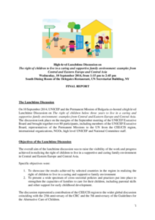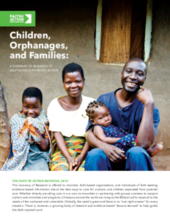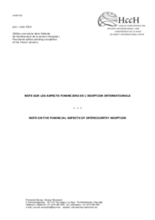Displaying 601 - 610 of 943
On 10 September 2014, UNICEF and the Permanent Mission of Bulgaria co-hosted a high level Lunchtime Discussion on The right of children below three years to live in a caring and supportive family environment: examples from Central and Eastern Europe and Central Asia.
This study tested whether the extent of delays in support seeking is associated with working alliance for parents with mild intellectual disabilities (MID) and whether the importance of working alliance may depend on parenting stress and availability of informal support.
Wendy McMahan, Director of Church Engagement for Food for the Hungry, shares a personal anecdote from her own family, illustrating the importance of family care.
This video features a segment of a talk on the effects of care environments on children, hosted by the Christian Alliance for Orphans. The key speakers featured include Dr. Kathryn Whetten & Dr. Charles Nelson, who discuss the Positive Outcomes for Orphans study (POFO) and the Bucharest Early Intervention Project (BEIP), respectively.
In this chapter of the Handbook of Child Well-Being, the authors review the findings from research on the cognitive and social-emotional development of children growing up in institutions, foster care and adoption.
This Summary of Research provides a concise overview of a range of studies and findings that can inform approaches to caring for children who, through orphanhood, abandonment, or other causes, have been separated from parental care.
To address the issues related to the financial aspects of intercountry adoptions, the Hague Convention initiated an Experts’ Group, which met in October 2012 and produced nine Conclusions and Recommendations, which they brought to the Permanent Bureau to publish as a “Note”.
This presentation from Innocenti’s Expert Consultation on Family and Parenting Support describes Promundo’s approach to engaging men as fathers and caregivers of children.
This presentation from Innocenti’s Expert Consultation on Family and Parenting Support focuses on parenting interventions for the wellbeing of children and families in an HIV/AIDS context.
This presentation from Innocenti’s Expert Consultation on Family and Parenting Support describes gender roles in parenting in Ethiopia, the missing role of fathers in parenting, legal/policy provisions of family support, and some work being done to engage fathers.



